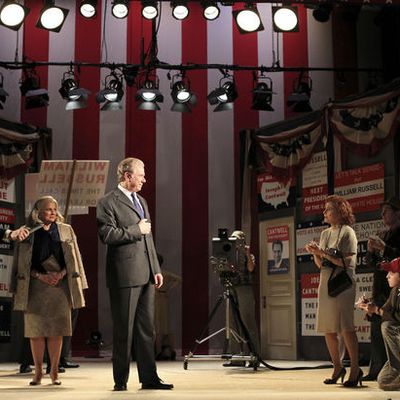
ÔÇ£Jeez, I hate an open convention,ÔÇØ laments a slippery senator (Dakin Matthews) in Gore VidalÔÇÖs The Best Man, his inexhaustible 1960 dramatization of basic American politics. ÔÇ£You canÔÇÖt ever tell whatÔÇÖs going to happen!ÔÇØ Newt Gingrich and his fellow moon-dreamers would surely disagree, of course, but most of us common folk (and all of the powerful) enjoy a modicum of predictability in our lives and in our leaders. Perhaps in our political melodramas, too: The Best Man, now enjoying its second star-bedazzled revival in twelve years ÔÇö this time with John Larroquette, Candice Bergen, James Earl Jones, Eric McCormack, and Angela Lansbury ÔÇö is hardly a nail-biter, and I donÔÇÖt mean that as criticism. Hearing a parable a second, third, or thousandth time doesnÔÇÖt diminish its impact a jot. Quite the contrary. WeÔÇÖve seen these characters and followed these plot lines many times before; we see them, in cruder, less articulate, less operatic form, every four years, give or take a midterm. That is, or should be, the whole point of reviving The Best Man, a play originally pegged to a very specific event ÔÇö the 1960 presidential campaign ÔÇö and which subsequently, and deservedly, found a place as a perennial election-year wisdom tale. Michael WilsonÔÇÖs new production experiences occasional bumps on its way to the inaugural ball, but this says more about its rollicking ambitions and hurtling velocity (a good thing in a show with two intermissions) than it does about its fitness to govern our attention, as citizens and theatergoers, for nearly three sumptuous hours.
The oft-told story: The wise and thoughtful candidate, one William Russell (Larroquette), faces a savage primary challenge from a smooth, ruthless, fearmongering demagogue, Joe Cantwell (McCormack). Cantwell has dirt on Russell, which he wonÔÇÖt hesitate to use; Russell gets dirt on Cantwell, too, and hesitates ÔÇö at what cost victory? Artie Hockstader (Jones), a Trumanesque ex-president and de facto party leader, looks to back the stronger candidate, not necessarily the better one. Throw into the mix RussellÔÇÖs estranged, embittered wife (Candice Bergen), his brass-knuckled political adviser (the ever-splendid Michael McKean), and the drawling powder-room power broker Sue-Ellen Gamadge (Lansbury, having a ball), and weÔÇÖve got ourselves a horse race: The Best Man functions as a kaleidoscope of every American political power-player, past and present. In a role fashioned to approximate Adlai Stevenson, Larroquette finds notes of sensual Clinton and filters them through the sexless sagacity and detachment of Obama. Bergen, clearly disciplining her well-publicized jitters, brilliantly wields them in the service of her character, a ÔÇ£good wifeÔÇØ who knows the ground is never shakier than when one is standing by oneÔÇÖs man. McCormack, as the McCarthyesque Cantwell, teases out bits of Romney and Santorum; itÔÇÖs a sharp, occasionally sour performance that forgoes all attempts at sympathy. (Banish the film versionÔÇÖs Cliff Robertson, all torment and shame-turned-to-rage, from your mind.) And then thereÔÇÖs James Earl Jones, an icon so towering in a part so Rushmore-sized, the racial realism of a black ex-president in 1960 is entirely beside the point: When he characterizes himself as ÔÇ£last of the great hicks,ÔÇØ it rings truer than true. (Think about it: Had Troy Maxson been white, with a streak of Vader in him, hell, he mightÔÇÖve been Harry Truman.)
At issue, as always, is whatÔÇÖs always at issue: For what is a man profited, if he shall gain the whole world, and lose his own soul? More to the point, for what is a nation profited? The Best Man is VidalÔÇÖs mammoth patrician intellect in a ReaderÔÇÖs Digest reduction, and thereÔÇÖs absolutely nothing wrong with that. Public intellectuals can and should aspire to be public communicators, especially when the need is great, and thereÔÇÖs nothing wrong with a straightforward morality play ÔÇö especially one that glistens with the good cynicÔÇÖs wit. ItÔÇÖs a proud tradition weÔÇÖd be wise to uphold and not sneer at. (Would we have an Aaron Sorkin if it werenÔÇÖt for Vidal classics like this: ÔÇ£I like the way you always manage to state the obvious with a sense of real discovery.ÔÇØ)┬á Star-casting a re-roasted chestnut in an election year might sound like the height of Broadway exigency, but in the case of this very indispensable chestnut, itÔÇÖs a public service. In which spirit, I call on the producers (great Americans, IÔÇÖm sure) to offer free or deeply discounted tickets to every schoolchild in the U.S. of A. If this election season has decided anything, itÔÇÖs this: We are, all of us, ideology aside, still schoolchildren when it comes to politics.
The Best Man is at the Gerald Schoenfeld Theatre through July 8.

